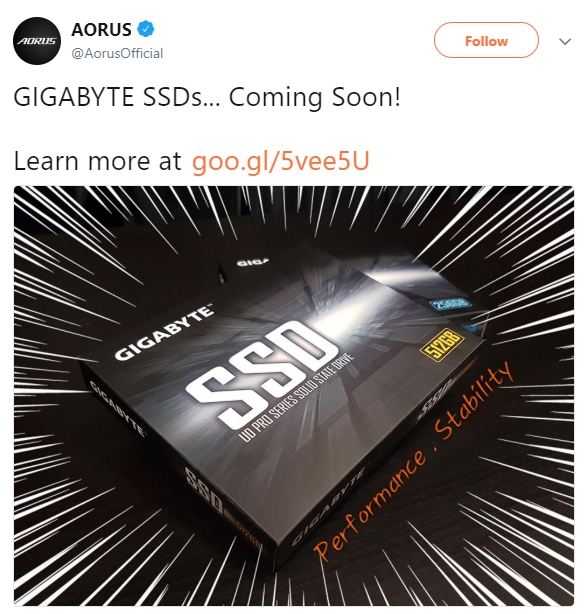Gigabyte Enters The SSD Market With UD PRO, Aorus Branding
Get Tom's Hardware's best news and in-depth reviews, straight to your inbox.
You are now subscribed
Your newsletter sign-up was successful
With an abundance of flash available, we should see more non-memory companies jump into the SSD pool. With one swift proclamation tweet, Gigabyte did just that. The company will launch several products in different form factors over time, but it's starting with the SATA 6Gbps 2.5-inch UD Pro Series using Toshiba BiCS3 FLASH.
“SATA interface SSDs are mainstream and have a considerable development history. The challenge is to develop a product of exceptional quality that stands out from the rest,” said Jackson Hsu, Deputy Director of the GIGABYTE Channel Solutions Product Development Division. “GIGABYTE UD PRO series SDDs are a testament to our strict adherence to producing high quality products. With DDR3L RAM, 3D NAND Flash memory, 256GB or 512GB storage capacity selections, the UD PRO series SDDs offer users a high performance, high stability, and high capacity product choice, without sacrificing flash memory or performance.”
Gigabyte is a diverse company with several divisions and product lines that span the far corners of the PC and server markets. Adding flash-based storage is a way to further diversify while giving loyal fans another avenue to feed the machine. Solid-state drives open the door for more bundling options with other products like motherboards, graphics cards, and notebooks.
The new UD Pro product series initially comes in two capacities, 256GB and 512GB. Prices look very aggressive at $68.99 and $119.99, but don't expect breakthrough performance from this series. The UD Pro is more of a mainstream SSD with 530 MB/s sequential read and 500 MB/s sequential write performance. The 512GB UD Pro sports the highest random performance of the two with up to 80,000 IOPS read and 75,000 IOPS write. The drives look like a good low-cost alternative to the Samsung 860 EVO and other top performance SSDs shipping today.
Gigabyte reached out to us this morning to say the company will soon launch M.2 NVMe and add-in card high-performance variants soon under the AORUS brand. We should see these and more exciting products at Computex next month.
| Part Number | GP-GSTFS30256GTTD | GP-GSTFS30512GTTD |
|---|---|---|
| Pricing | $68.99 | $119.99 |
| Interface | SATA 6Gbps | SATA 6Gbps |
| Form Factor | 2.5-Inch | 2.5-Inch |
| Capacity | 256GB | 512GB |
| Warranty | 3-Years or 100 TBW | 3-Years or 200 TBW |
| Media | Toshiba BiCS3 TLC | Toshiba BiCS3 TLC |
| DRAM | 256MB DDR3L | 512MB DDR3L |
| Sequential Read | 530 MB/s | 530 MB/s |
| Sequential Write | 500 MB/s | 500 MB/s |
| Random Read | Up to 70,000 IOPS | Up to 80,000 IOPS |
| Random Write | Up to 40,000 IOPS | Up to 75,000 IOPS |
Get Tom's Hardware's best news and in-depth reviews, straight to your inbox.

Chris Ramseyer was a senior contributing editor for Tom's Hardware. He tested and reviewed consumer storage.
-
photonboy I find the AMD StoreMI and the competing Intel stuff to be very interesting... for example with the AMD StoreMI (not sure if you need both X470 boards and Ryzen 2000 series CPU) you can use an M.2 SSD in conjunction with another drive, then the software moves stuff around based on usage patterns.Reply
i.e. 256GB SSD + 2TB HDD
You might be playing a GAME and see frequently accessed texture move from the HDD to the SSD.
StoreMI can also assign a DRAM cache (DDR4) though not sure how well that works.
INTEL just added support for secondary drives. Normally the SSD (i.e. Optane) is a COPY of the fast data (StoreMI moves the data but does not copy it which save space but makes backup a bit trickier).
Interesting to see how all this progresses... that may tie in at some point to the VEGA HBCC (High Bandwidth Cache Controller) to swap data in and out of VRAM as quick as possible from DDR4 memory.
I still don't understand the point of HBCC since system/VRAM swapping should continue to be improved in game engines to the point it's intelligently buffered before it becomes an issue... does this feature even work yet?
